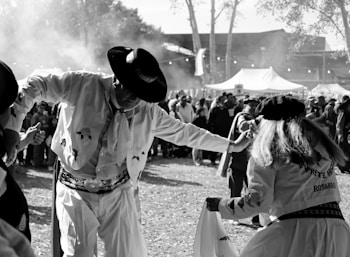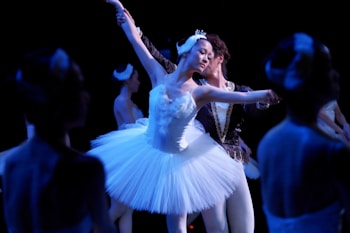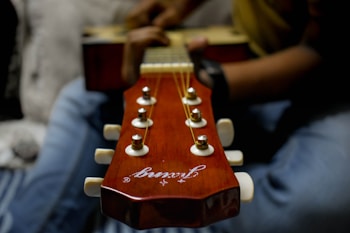 Music and Dance Collection
Music and Dance Collection
A collection of Spanish words related to the themes of music and dance.
(compañía de) danza clásica
(compañía de) danza clásica is a Spanish term that is often translated as '(partnership) classical dance' in English. It is used to describe a group or company of dancers that perform classical dance forms, such as ballet. It can refer to both the collective group of dancers and the actual performances they produce. The inclusion of 'compañía de' emphasizes the organized or partnership nature of the group. This term is often used in contexts related to performing arts, culture, and entertainment.
Example sentences with (compañía de) danza clásica →(compañía de) danza contemporánea
The term '(compañía de) danza contemporánea' in Spanish refers to a '(company) contemporary dance'. This usually specifies a body or group dedicated to performing, creating, and fostering contemporary dance, a genre of dance that emerged in the mid-20th century, incorporating elements from many styles of dance. The '(compañía de)' aspect implies organization, collaboration, and teamwork in this artistic endeavor.
Example sentences with (compañía de) danza contemporánea →(un) musical
(Un) musical is a Spanish term used to indicate a musical show or performance. This term often refers to a genre of drama in which singing and dancing play an essential role, often telling a story. The term is derived from the English word 'musical', and it's used almost universally across the Spanish-speaking world. However, like many cultural terms, the context and usage can vary slightly from region to region, but generally the term '(un) musical' always relates to a show or performance which incorporates music, dancing, and often singing too.
Example sentences with (un) musical →
acto
The Spanish word 'acto' translates to 'act' in English. This could be related to the action or deed done by a person, or it could refer to a segment of a performance or play in the context of theater. Just like in English, the usage of this term in Spanish largely depends on the context.
Example sentences with acto →actuar
The word 'actuar' is a verb in Spanish, it translates to the English verb 'to act'. This word can describe performing actions generally or, more specifically, it can be used to express the act of performing in a play, a film, or any other form of theater or dramatization. Aside from these, 'actuar' can also mean to take action or conduct oneself in response to something.
Example sentences with actuar →actuar en un auditorio
The phrase 'actuar en un auditorio' is Spanish for 'acting in an auditorium'. This typically refers to the act of performing a play, concert, or some other form of entertainment in a large public venue specifically designed for such types of performances. The key verb here is 'actuar', which can not only refer to the act of performing a role in a play or film, but can also imply taking action in a broader sense.
Example sentences with actuar en un auditorio →actuar en vivo
The Spanish term 'actuar en vivo' translates to 'perform live' in English. It's frequently used in the context of live performances, such as concerts, theater, or other live events. When someone is 'actuando en vivo', they are performing live, highlighting the immediacy and authenticity of the performance. This phrase holds a context in the realm of entertainment and arts, where performances are often valued for their live, one-of-a-kind experiences.
Example sentences with actuar en vivo →
armonía
The Spanish word 'armonía' translates to 'harmony' in English. It can refer to a pleasing arrangement of parts, congruence, or compatibility in English. In music, 'armonía' means the simultaneous combination of tones, especially when blended into chords pleasing to the ear. It can also denote peace and understanding among individuals or groups. Thus, 'armonía' encapsulates a sense of order, balance, and peace.
Example sentences with armonía →
bailar
The word 'bailar' is a verb in Spanish, which translates to 'dance' in English. It is used to describe the activity of moving one's body rhythmically, typically to music and within a particular space, for the purpose of expressing an idea or emotion, releasing energy, or simply deriving pleasure from the movement itself. 'Bailar' can also be used in various contexts such as 'bailar la salsa' which means 'to dance salsa'. Please note that conjugation rules apply when using this verb, depending on the tense and subject of the sentence.

bailar al compás (de la música)

bailarín
The Spanish word 'bailarín' translates to 'dancer' in English. It is a masculine singular noun often used to describe a person who dances professionally or as a hobby. Like other Spanish words, 'bailarín' can change forms to indicate the gender and number of people it's referring to; for example, the feminine singular form is 'bailarina', the masculine plural is 'bailarines', and the feminine plural is 'bailarinas'. It derives from the verb 'bailar', which means 'to dance'.
Example sentences with bailarín →baile agarrado
The term 'baile agarrado' comes from Spanish and it is often used to describe a type of dance. The literal translation of 'baile agarrado' is 'dance grabbed', but in English, it's often referred to as a 'partner dance' or 'close dance'. It typically involves two participants who hold or 'grab' each other in a coordinated and rhythmic movement. This dance style can be found in many cultures and is associated with various types of music.
Example sentences with baile agarrado →baile de salón
The Spanish phrase 'baile de salón' translates to 'ballroom dance' in English. It refers to a type of dance that takes place in a large room or hall, which is specially prepared for this purpose. This phrase might be linked with certain types of social or competitive dancing such as tango, salsa, waltz, or cha-cha. These dances are often performed in formal or elegant settings, such as weddings or dance competitions. The phrase 'baile de salón' can also refer to the specific style or techniques used in this type of dance.
Example sentences with baile de salón →
balada
The Spanish word 'balada' does not mean 'bullet' in English. Instead, it translates to 'ballad' which typically refers to a slow, typically sentimental or romantic, song. It also might refer to a kind of slow popular music. For the English equivalent of 'bullet', you would use 'bala' in Spanish.
Example sentences with balada →
ballet
The word 'ballet' is the same in both Spanish and English. It refers to a highly technical form of dance with its own vocabulary. It originated in the Italian Renaissance courts of the 15th and 16th centuries and was later adopted in France. Ballet is often choreographed and performed by trained artists, often accompanied by music. It uses precise, formalized steps, which is why ballet is often considered to be the basis of other high-level dance genres. From formalized court spectacles, it became an independent art form and spread across the world where it continues to contribute significantly to the world of performing arts.
Example sentences with ballet →banda
Banda is translated to 'Band'. It is a group of people who play music together usually consisting of a combination of string, wind, and percussion instruments.
Example sentences with banda →
bastos
batería
Drums are a kind of musical instrument that you play by hitting it with sticks or your hands. 'Batería' in Spanish can mean both drums and battery, but within the context of music, it refers to drums.
Example sentences with batería →canción
Canción is the Spanish term equivalent to 'song'. It refers to a short musical composition with words.
Example sentences with canción →







